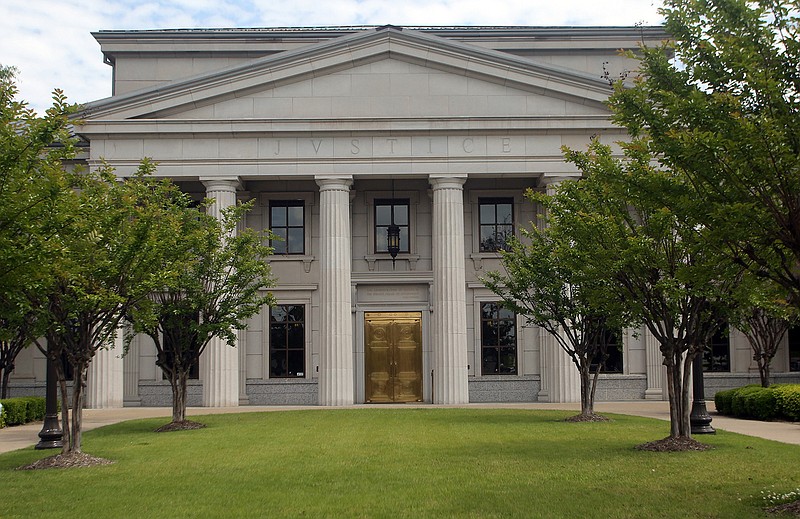Plaintiffs in the LEARNS Act lawsuit responded Thursday to a request that the Arkansas Supreme Court step in and reverse a lower court order that blocked the education law from taking effect.
The lawsuit, filed last month, aims to delay implementation of the LEARNS Act, Gov. Sarah Huckabee Sanders' signature education overhaul, and claims lawmakers erred when approving a parliamentary procedure to make the law take effect immediately.
Last week Pulaski County Circuit Court Judge Herbert Wright issued an order that the law should not take effect until after a June 20 hearing. That ruling prompted Attorney General Tim Griffin to file an emergency motion Tuesday asking the Supreme Court to step in and overturn Wright's order.
The plaintiffs, which include 11 Phillips County residents, aim to stop a charter school nonprofit from taking control of the Marvell-Elaine School District. Last month, the state Board of Education used a provision of the LEARNS Act to approve a contract that allows Friendship Education Foundation, a D.C.-based charter school nonprofit, to take control of the school district.
The lawsuit hinges on whether lawmakers followed the Arkansas Constitution by holding separate votes on the emergency clause for the LEARNS Act, a procedure that allows laws to take effect immediately upon passage. Normally, laws do not come into action until 91 days after the legislative session ends, unless legislators approve an emergency clause.
When voting for the LEARNS Act, lawmakers were told their one vote was for the bill and the bill's emergency clause, as shown in the official video recording of the vote on the Legislature's website. Thursday's response was the first salvo in a back-and-forth between lawyers trying to sway the Supreme Court to their side, with the attorney general's office also countering.
Ali Noland, an attorney for the plaintiffs in the lawsuit against the Arkansas Department of Education, wrote in her response that the attorney general's office is asking the court "to disregard the truth captured in those videos in favor of a politically convenient absurdity."
Aritcle 5, Section 1 of the Arkansas Constitution states the Legislature "shall vote upon separate roll call" to approve an emergency clause. Emergency clauses are meant for laws aimed at the "preservation of the public peace, health and safety," according to the Arkansas Constitution.
In her 12-page response, Noland also said the LEARNS Act's emergency clause is faulty, giving insufficient reasoning for why it needs to take effect immediately and only applying to some parts of the law.
Griffin's office said in its motion Tuesday the General Assembly records votes for bills and the emergency clause separately in its official journal, a practice that lawmakers have used for decades, and that the lower court's order would "sow chaos," which would not only affect the LEARNS Act but also is "jeopardizing criminal convictions, and invalidating numerous other laws."
A little more than two hours later, the attorney general's office responded to Noland, saying the videos of the General Assembly confirm their argument that lawmakers staged one vote but recorded it separately, saying it shows "the General Assembly conducted two separate votes, simply at the same time."
Since lawmakers were told their one vote counted for both the LEARNS Act and the bill's emergency clause, legislators knew they were making separate votes simultaneously, the attorney general's office said.
"As the State noted in its opening brief, members from both Houses knew they were voting on both issues," according to the response in court from Griffin's office.
CONTINUED COURT BATTLE
The temporary restraining order blocking the LEARNS Act from taking effect was a blow to its supporters and drew condemnation from Sanders, who called Wright "a far left judge."
The legislation, which passed mostly along party lines in the Republican-controlled General Assembly, is a 145-page omnibus bill that covers everything from higher salaries for teachers to a ban on critical race theory. The legislation also creates a voucher program where students can use state dollars to cover the cost of attending a private or home school, higher standards for literacy, a dual-diploma program for career technical education and enhanced guidelines for school security.
To show support for the LEARNS Act two national conservative education groups -- yes. every kid foundation and Americans for Prosperity -- asked for permission to file briefs in support of the attorney general's efforts Thursday.
"Gov. Sanders' LEARNS Act is a transformational piece of legislation that has the power to impact students for decades to come," Americans for Prosperity Foundation state director Ryan Norris said in a news release. "The delay in implementing this law is a disappointment to the thousands of Arkansas families who have been looking forward to educational freedom. We strongly support the Attorney General's action to allow this law to move ahead."
For her part, Noland responded by saying the Supreme Court should not consider the brief as the groups are focused on the law's voucher program, something that is not a question in the lawsuit.

